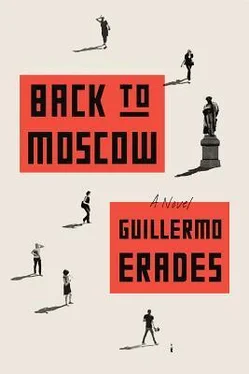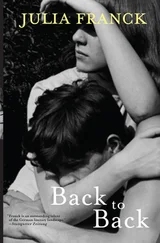Built in the early 1930s as a residence for the soviet nomenklatura, the Dom na Naberezhnoy had also hosted distinguished academics, war heroes and pretty much everybody who had been elitni back then. Other than ample apartments and the sushi restaurant, the residential complex boasted a cinema, a clinic, shops, a stolovaya, common spaces. But what made it a legendary building in Moscow was not just the social standing of its former inhabitants, but the fact that many of them had vanished during their stay. I had been told that the building contained an elaborate system of secret passages connected to the luxurious flats and that, at the peak of Stalin’s repression, these corridors were used by the secret services to spy on the building’s notorious inhabitants and snatch them in the middle of the night.
Tatyana arrived a few minutes after me and was escorted to my table by the same waiter. She was wearing a white top with a scooped neckline, almost see-through. I could see the lacework of her bra. Her face was flushed from the heat, her eyes greener than ever, her blonde curls untied and airy. I served her tea and we ordered two lunch menus — mine with salmon sushi, hers with chicken teriyaki.
I asked Tatyana if she had ever shown any apartments in the Dom na Neberezhnoy.
‘I showed a three-room apartment a few months ago,’ she said. ‘So expensive. This is one of the most exclusive buildings in Moscow. The views are very beautiful, you can see the churches inside the Kremlin.’
‘Beautiful indeed,’ I said, glancing out of the window.
‘Most available flats are now rented by foreigners though. Russians don’t want to live here.’
‘Why’s that?’
Tatyana tried to take a sip of tea, but it was too hot. She placed the cup back on the table. ‘Because of the ghosts.’
‘Ghosts?’
‘You know, the spirits of dead people. The building is haunted.’
‘Of course,’ I said. ‘Ghosts.’
‘The building’s residents were killed here during Stalin,’ Tatyana said. ‘Their spirits remain in the building.’
‘And people believe in these things?’
‘I wouldn’t want to live in this building,’ she said. ‘Just in case.’ She tried to smile, but I could see something was bothering her.
The waiter brought us bowls of miso soup. I held mine with two hands and looked out the window. I could see the traffic thickening, cars crawling across the bridge with their windows open, then the river, dark and silent. The glass was thick and I could not hear the traffic or feel the heat. Like watching a silent movie.
‘We need to talk,’ Tatyana said.
This was unusual. Tatyana and I never needed to talk, at least not the kind of talk that needed to be announced. It had crossed my mind, walking in the heat on my way to Ris i Ryba, that she might want to discuss something in particular. Why hadn’t she suggested lunch before she left for work that morning? In fact, I had felt a slight distancing in the last few days, a small drop in the temperature of our relationship, as if she were holding something against me. Nothing dramatic, just the tone of her voice or the way she wouldn’t follow up on a conversation I initiated.
Perhaps Tatyana was about to suggest moving into my apartment on weekends as well, fully taking over what was once my separate life. I wasn’t sure I was ready to give it up. I took a sip of miso soup and I prepared myself to defend the nature of our arrangement, to repel any threats to the status quo.
Tatyana left her bowl of soup on the table and held my hand. Her hand was warm from the soup.
‘Martin, I’m temporarily,’ she said, with a shaky voice, then stopped and looked at me, waiting for a reaction.
‘In what sense?’
‘You heard me.’
‘I don’t think I understood.’
Tatyana tried to smile. ‘You did.’
‘I didn’t,’ I said, a bit irritated. ‘Temporarily what?’
At that moment the waiter brought our plates of salmon roll and chicken and two small bowls of seaweed salad. I took a pair of wooden chopsticks from their paper wrapping, split them and offered them to Tatyana. She accepted them with two hands, somewhat ceremoniously.
‘I’m pregnant,’ she said. In case I still didn’t understand, she added, ‘With a baby in my belly.’
That’s when I really learned the difference between vremennaya, with a v, temporarily, and beremennaya, with a b, pregnant.
I saw that the line of cars was now stuck on the bridge, inching towards the centre, their exhaust pipes expelling smoke into the hot Moscow air. Old soviet cars, Ladas and Volgas, and new German cars owned by rich Russians. I could now recognise luxury models, at least those sold at Stepanov’s dealership.
‘How do you know?’ I said, turning to Tatyana.
‘Women know these things.’
‘Have you been to a doctor?’
Tatyana’s lips were shiny, the sunlight reflected on her lip-gloss. ‘I took a test. I’m probably five or six weeks pregnant.’
‘And you are sure it’s mine?’
‘Why do you even have to ask? You know you’re the only man in my life.’
Giving myself time to think, I gazed at the river, focusing my eyes on the closest of the fountains. The water was pumped high into the air, with strength, and, in the cloud of falling drizzle, I could discern the timid shades of a rainbow.
Gradually, Tatyana’s words started to become a reality, the concept of her pregnancy growing in my head, like a balloon inflating and occupying all the corners of my mind. But I wasn’t exactly thinking about the life-shattering implications of the news, or pondering our options. For some reason, I found my mind preoccupied with Tatyana’s teeth, the one imperfection on her face. It occurred to me that perhaps I should take Tatyana to the international medical centre and have her front teeth fixed.
When I looked back, Tatyana’s face was red.
I held her hand. ‘Everything will be OK,’ I said.
She smiled.
Sunlight illuminated her from behind, a halo of bright light forming around her loose golden hair. She looked prettier than ever.
I kissed Tatyana across the table.
‘Who have you told about this?’ I asked.
‘Nobody, I only found out this weekend. My breasts hurt a bit, and I was late, so I bought the test.’
‘I thought we had been careful,’ I said.
‘Most of the time. These things happen. It must have been at the dacha, in the forest. Remember?’
‘But you said it was safe.’
‘Martin, I’m a grown woman. I want to have the baby.’
‘We didn’t plan this,’ I said.
‘You can’t plan everything in life.’
A long-ago memory from a rainy day was now casting a shadow over my thoughts. ‘Sudba,’ I said.
‘Yes.’ Tatyana smiled. ‘It’s destiny.’
The food remained on the table, untouched. The waiter came to ask if everything was OK.
‘Everything’s good,’ I said. Then, turning to Tatyana, I repeated, ‘Everything’s good.’
I looked at my sushi roll, poked at it with my chopsticks, unable to eat. When I looked up, Tatyana was having a go at her chicken.
SATURDAY MORNING, THE RAIN is streaming down the old windows of my Amsterdam flat. At the dining table, under the dim light of a shaky floor lamp, Katya and I are having breakfast. Moscow is, at this point, nothing but a remote possibility. We finish our omelette, discuss our plans for the weekend and, over a second cup of tea, Katya says, ‘Martin, I’m pregnant.’
I remember the moment clearly because, later on, after she’d left me, I went back to it often, and the memory of that morning had a particular way of making me miserable. Katya is wearing a green Adidas T-shirt she used to borrow from me. We’ve placed a brick under the windowpane to lift the heavy wooden frame a little and let a fresh breeze into the flat. A few raindrops drip onto the carpet, but Katya says it’s OK, leave the window open for a while. We’re listening to Tchaikovsky’s Swan Lake , a CD from Katya’s small, classical-oriented music collection. She has just refilled our mugs with boiling water, not bothering to replace the used tea bags.
Читать дальше












